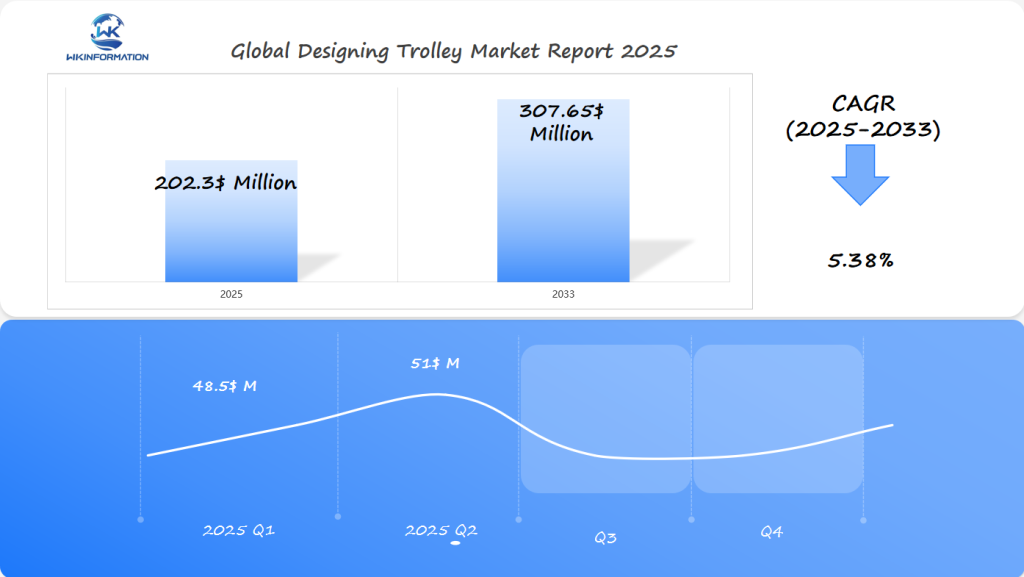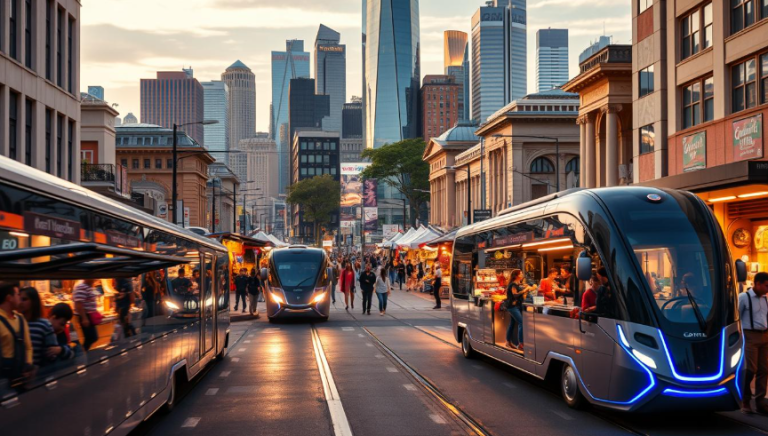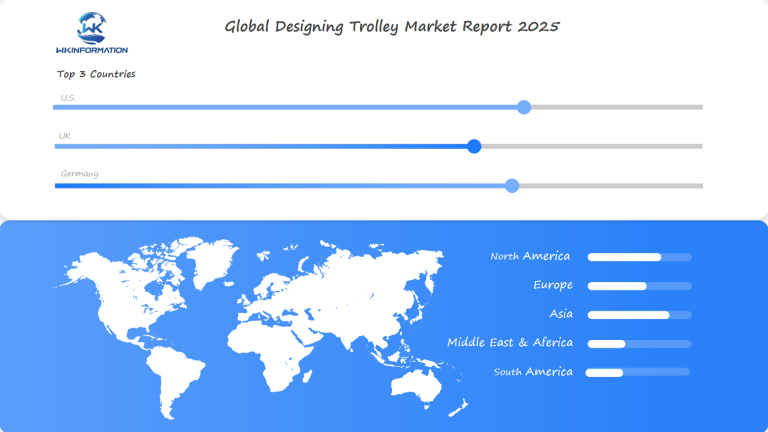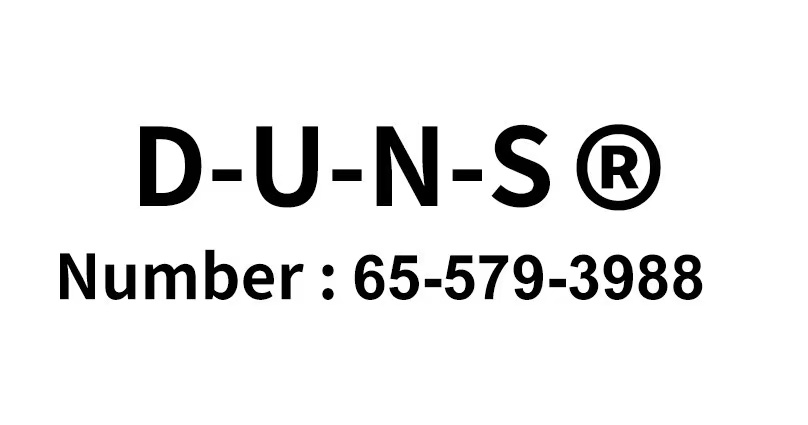2025 Designing Trolley Market Estimated to Reach $202.3 Million with Key Developments in the U.S., UK, and Germany
Explore the evolving Designing Trolley Market trends, featuring innovative ergonomic designs, sustainable materials, and advanced mobility solutions. Projected growth to $202.3M by 2025.
- Last Updated:
Designing Trolley Market Forecast for Q1 and Q2 of 2025
The Designing Trolley market is projected to grow at a CAGR of around 5.38% from an estimated USD 202.3 million in 2025. By the end of Q1 2025, the market size is expected to be approximately USD 48.5 million, driven by the rising demand for industrial and workshop tools in the manufacturing and construction sectors. By Q2 2025, the market is expected to expand to around USD 51 million as industries increasingly adopt innovative solutions to improve workflow and operational efficiency.
The U.S., UK, and Germany are the leading markets for Designing Trolleys. The U.S. continues to lead in manufacturing innovation, while Germany’s strong industrial sector and the UK’s growing focus on advanced manufacturing will contribute to ongoing market growth.

Key Takeaways
- Projected market growth to $202.3 million by 2025
- Significant developments in U.S., UK, and German markets
- Technological innovations driving market expansion
- Increasing demand across multiple industry sectors
- Focus on advanced design and functionality
Analyzing the Upstream and Downstream Supply Chain of the Designing Trolley Market
The designing trolley market is a complex system. It connects many parts that help make trolleys better and more efficient. This includes raw materials, makers, and how goods are sent out.
Raw material suppliers are key in making trolleys. They decide how good and strong the final product will be. Important things to think about include:
- Durability of base materials
- Weight requirements
- Cost-effectiveness
- Environmental sustainability
Raw Material Suppliers and Trolley Design Impact
Today, trolleys are made with new materials like strong aluminum and special polymers. These materials help make trolleys light but strong. They meet many needs in different industries.
Manufacturing Processes and Technological Advancements
New tech has changed how trolleys are made. Now, there’s more precision and automation. Tools like CAD and 3D printing help make designs faster and more custom.
Distribution Channels and End-User Industries
Trolleys go to many places, like:
- Retail and e-commerce
- Warehousing and logistics
- Healthcare and hospitality
- Industrial manufacturing
Each place needs trolleys that are just right for them. This pushes for new designs and ways to use trolleys.
Emerging Trends and Innovations in Designing Trolleys for 2025
The market for designing trolleys is changing fast. New tech and what people want are leading the way. This is making big changes in how we handle and move things.
New trolley tech is changing how we move things around. It’s making things smarter and more efficient. This is true for many industries.
Smart Trolleys and IoT Integration
Smart trolleys are a big step forward. They use IoT to track things in real time. They also help manage stock and give insights into how things work.
- GPS-enabled location tracking
- Automated inventory counting
- Predictive maintenance alerts
- Digital weight measurement
Eco-friendly Materials and Sustainable Design
Now, making trolleys that are good for the planet is key. Companies are using green materials and methods. This helps cut down on harm to the environment.
| Material Type | Environmental Impact | Recyclability |
|---|---|---|
| Recycled Aluminum | Low Carbon Footprint | 95% Recyclable |
| Biodegradable Composites | Minimal Waste | 100% Compostable |
| Renewable Plastics | Reduced Petroleum Dependency | 80% Recyclable |
Ergonomic Improvements for User Comfort
Designing trolleys with the user in mind is important. Makers are working to make them easier to use. This means less strain and a better experience for everyone.
- Adjustable handle heights
- Lightweight frame construction
- Shock-absorbing wheel systems
- Balanced weight distribution
The designing trolley market is expected to grow to $202.3 million by 2025. Smart trolleys and green design are key to this growth.
Key Restrictions and Challenges Impacting the Designing Trolley Market
The designing trolley market faces many challenges. These shape its strategic landscape. Manufacturers and leaders must tackle these while staying competitive and innovative.
Regulatory compliance is a big worry for trolley designers and makers. They must follow strict safety standards. This affects how they develop products and enter the market.
Safety Standards and Compliance Requirements
Key regulatory challenges include:
- Strict material safety guidelines
- Ergonomic design requirements
- Load-bearing capacity specifications
- Industrial workplace safety regulations
Cost Pressures and Market Dynamics
Cost pressures are another big challenge. Makers must balance quality with price. This affects their market position.
Competitive Landscape
There are also alternative products to deal with. Makers must keep innovating to stand out. This competition pushes for better technology and designs in the trolley market.
The designing trolley market is estimated to reach $202.3 million by 2025, showing growth despite challenges.
To tackle these challenges, makers can invest in new tech, find cost-effective designs, and follow strict safety standards.

Geopolitical Dynamics Influencing the Designing Trolley Market Landscape
The designing trolley market is changing a lot because of global politics. Trade policies are changing how things are made and moved around the world.
Companies are now thinking differently about making and selling designing trolleys. The way things work in different places is key to their success.
Trade Policies Transforming Global Supply Chains
Trade rules are making things hard and easy for trolley makers. Here are some big changes:
- Companies are moving where it’s cheaper to make things
- They have to deal with many rules in different places
- They must follow local rules for their products
Regional Market Variations and Local Preferences
Every area likes different things in designing trolleys. Culture really affects how products are made and what they can do.
| Region | Market Characteristic | Key Design Preference |
|---|---|---|
| North America | High-tech integration | Ergonomic, customizable trolleys |
| Europe | Sustainability focus | Eco-friendly materials |
| Asia-Pacific | Cost-efficiency | Modular, adaptable designs |
Cross-border Collaborations Driving Innovation
Working together across borders is very important for trolley market growth. Companies are using global knowledge to make better products.
“Collaboration transcends geographical boundaries in modern manufacturing” – Industry Expert
The designing trolley market is always changing. Politics around the world are key to new ideas and plans for the future.
The Role of Type Segmentation in Shaping the Designing Trolley Market
Market segmentation is key to understanding the wide range of trolley types. These trolleys serve different industries in unique ways. The designing trolley market offers solutions for various sector needs.
Companies are now making trolleys that meet specific industry needs. This approach leads to more efficient and customized material handling solutions.
Industrial Trolleys: Powerhouses of Efficiency
Industrial trolleys are a vital part of the market. They are made to improve material handling and workplace productivity. These trolleys have strong features for tough industrial settings.
- Heavy-duty construction for maximum durability
- Ergonomic designs to reduce worker strain
- Customizable configurations for unique industrial needs
Retail and Shopping Trolleys: Enhancing Customer Experience
Retail trolleys have seen big design changes to better shopping experiences. Today’s shopping trolleys have advanced features for both function and comfort.
| Feature | Benefit |
|---|---|
| Lightweight Materials | Easier maneuverability |
| Ergonomic Handles | Reduced physical strain |
| Smart Cart Technology | Enhanced shopping interaction |
Specialized Trolleys for Healthcare and Hospitality
New markets are seeing more demand for specialized trolleys. The healthcare and hospitality sectors are leading in trolley design innovation.
- Medical supply trolleys with precision organization
- Hospitality service trolleys with modular configurations
- Infection control-focused designs
The global designing trolley market is expected to hit $202.3 million by 2025. This shows how important market segmentation is for creating trolleys for various industries.
Exploring the Key Applications of Designing Trolleys Across Industries
Designing trolleys have changed how we handle materials and work more efficiently in many fields. These tools offer specific solutions for different industries. They help businesses manage resources better, improve customer service, and make workflows smoother.
The global shopping trolley market is growing fast. It was worth USD 202.3 million in 2025 and is expected to hit USD 307.65 million by 2033. This shows how important trolleys are in today’s business world.
Warehousing and Logistics: Optimizing Material Handling
In warehousing and logistics, trolleys are key for better material handling. They help move goods quickly, cut down on manual work, and boost productivity. The main benefits are:
- Fast inventory transport
- Less strain on workers
- More safety at work
- Better work efficiency
Retail and E-commerce: Enhancing Customer Experience
Retail uses trolley design to make shopping smoother. With the shopping cart market set to reach $307.65 million by 2033, new innovations are changing how we shop.
| Cart Type | Market Segment | Key Features |
|---|---|---|
| Traditional | Supermarkets | Cost-effective, standard design |
| Smart | Hypermarkets | Digital tracking, weight sensors |
| Hybrid | E-commerce | Adaptable, multi-purpose design |
Healthcare: Improving Patient Care and Efficiency
Healthcare uses special trolleys to improve patient care and work flow. Customized trolley designs help with things like giving out medicine, moving equipment, and helping patients.
Trolleys are crucial in many industries. As technology gets better, these tools keep evolving to meet the changing needs of businesses.
Regional Market Outlook for Designing Trolleys Worldwide
The global trolley market is changing fast in different parts of the world. New technologies and strategies are driving growth. This change is seen in how trolleys are designed and made.
Looking at how different areas handle trolley design gives us important insights. Each area has its own set of opportunities and challenges for makers and users.
North America: Technological Advancements and Market Leaders
North America leads in trolley design with its cutting-edge tech. The market here is known for:
- Advanced manufacturing
- Strong logistics
- Big investments in research
Europe: Sustainability Focus and Design Innovation
In Europe, there’s a big push for green trolley design and new ideas. Key trends include:
- Using eco-friendly materials
- Improving ergonomics
- Following circular economy principles
Asia-Pacific: Rapid Industrialization and Market Growth
The Asia-Pacific area is growing fast, with:
- Fast industrial growth
- Increasing manufacturing skills
- More demand for efficient transport
China and Japan are leading the way with new manufacturing methods and design investments.
The global trolley market is expected to hit $202.3 million by 2025. Each region brings its own strengths to this growing field.

USA Designing Trolley Market Growth Factors and Insights
The USA trolley market is changing fast thanks to new tech and shifting industry trends.
E-commerce has changed how companies handle materials and logistics. They’re now investing in advanced trolleys. These can keep up with the fast-changing needs of today’s distribution systems.
E-commerce Boom and Trolley Demand
More people shopping online has made trolleys more important. Businesses want new trolley designs to make warehouse work better and faster.
- More orders mean trolleys need to get better
- They need to be made to fit e-commerce needs
- They must be able to carry more and move easily
Warehouse Automation Revolution
Automation in warehouses is key to the trolley market’s growth. Now, trolleys work with smart tech. This makes handling materials and keeping track of stock easier.
| Automation Feature | Impact on Trolley Design |
|---|---|
| IoT Integration | Real-time tracking and inventory management |
| Automated Guidance Systems | Improved navigation and efficiency |
| Smart Load Balancing | Optimized weight distribution |
Customization Trends in the U.S. Market
In the U.S., there’s a big push for custom trolley solutions. Makers are working on designs that fit many needs. This includes retail and healthcare.
UK's Designing Trolley Market Trends, Opportunities, and Future Projections
The UK trolley market is going through big changes. These changes come from economic shifts and new technologies. Market analysis shows there are great opportunities for growth in the future.
Brexit’s Influence on Supply Chain Dynamics
Brexit has changed the UK’s manufacturing scene a lot. It has made trolley designers think differently about their supply chains. The Brexit impact has led to several key changes:
- More focus on making things locally
- Improving domestic production skills
- Smarter ways to buy materials
Sustainable Trolley Design Initiatives
The UK market is moving towards greener trolley designs. Companies are using eco-friendly materials and new ways to make things. This helps reduce harm to the environment.
Emerging Specialized Trolley Market Segments
Niche markets are growing fast. They offer specialized trolley designs for specific needs. Healthcare, logistics, and retail sectors are leading the way. They want solutions that make things more efficient.
The future of UK trolley design is about being adaptable, green, and tech-savvy.
Germany Designing Trolley Market Key Insights and Market Drivers
The Germany trolley market is a leader in innovative design. It uses German engineering to improve manufacturing. Germany is a key player in the global market, known for its advanced trolley solutions.
Industry 4.0 has changed trolley design and making in Germany. Key changes include:
- Advanced automation in production systems
- Smart manufacturing techniques
- Enhanced precision in engineering design
- Intelligent tracking and monitoring technologies
German Engineering Excellence in Trolley Manufacturing
German makers set global standards in trolley design. They focus on quality and new tech. This makes them stand out worldwide.
| Manufacturing Characteristic | German Approach |
|---|---|
| Precision Engineering | Highest global standards |
| Material Quality | Advanced lightweight composites |
| Technological Integration | Industry 4.0 compatible systems |
Export Opportunities and Global Market Expansion
The Germany trolley market has big growth chances abroad. German makers are growing by offering customized solutions for different needs worldwide.
Looking Ahead to Technological Advancements and Future Trends in Designing Trolleys
The designing trolley market is seeing a big change with new tech. These innovations are changing how we handle and move materials. New trends in trolleys are coming fast, thanks to advanced tech that’s making old ways seem outdated.
New tech is changing how trolleys are made and work. AI is key in making trolleys smarter and more efficient. It helps them fit into complex work settings better.
AI and Machine Learning in Trolley Design Optimization
Machine learning is changing trolley making in big ways. It lets us:
- Do predictive maintenance
- Optimize routes
- Watch performance in real-time
- Make designs that fit specific needs
3D Printing and Rapid Prototyping Technologies
3D printing is making trolleys more advanced. It lets makers:
- Try out complex designs fast
- Save money on making things
- Make parts that are both light and strong
- Design trolleys for specific needs
Integration of Augmented Reality in Trolley Usage
Augmented reality is changing how we use trolleys. It gives us real-time data and better insights. Workers can get important info right away, making things more efficient and cutting down on mistakes.
These new tech steps are making the designing trolley market grow fast. The U.S. market is expected to hit $307.65 million by 2033. This shows the industry’s focus on staying ahead with new tech.
Competitive Landscape of the Designing Trolley Market
The designing trolley market is seeing big changes in how companies compete. Industry analysis shows a mix of big names and new players pushing tech forward.
-
ViPush – EU
-
Cube Design – Denmark
-
Life Space Journey – Australia
-
Animo – Netherlands
-
Rollergrill – France
-
Alias – Italy
-
Classicdesign – USA
-
Serenite Luxury – Monaco
-
Architonic – Switzerland
-
Arcahorn – Italy
Overall
| Report Metric | Details |
|---|---|
| Report Name | Global Designing Trolley Market Report |
| Base Year | 2024 |
| Segment by Type |
· Manual trolleys · Electric Trolleys · Automated Trolleys |
| Segment by Application |
· Retail · Healthcare · Hospitality · Industrial · Others |
| Geographies Covered |
· North America(United States,Canada) · Europe(Germany,France,UK,Italy,Russia) · Asia-Pacific(China,Japan,South Korea,Taiwan) · Southeast Asia(India) · Latin America(Mexico,Brazil) |
| Forecast units | USD million in value |
| Report coverage | Revenue and volume forecast,company share,competitive landscape,growth factors and trends |
The designing trolley market is set to grow a lot. Experts predict it will hit $307.65 million by 2033. This growth comes from new designs and more demand in different areas.
Looking ahead, the market looks bright for makers and investors. Online shopping, better logistics, and automation are pushing the industry forward. North America, Europe, and Asia-Pacific are key areas for growth, with trolleys becoming more popular in healthcare, retail, and transport.
By 2025-2033, the market could see big changes. Smart tech, green materials, and custom designs will be key. Companies that focus on light, easy-to-use, and tech-rich trolleys will likely lead the market.
Several things will shape the market’s future. These include new tech, rules, and world economy trends. Companies that can quickly adapt, use advanced methods, and meet changing needs will do well in this fast-changing field.
Global Designing Trolley Market Report(Can Read by Free sample)–Table of Contents
Chapter 1:Designing Trolley Market Analysis Overview
- Competitive Forces Analysis(Porter’s Five Forces)
- Strategic Growth Assessment(Ansoff Matrix)
- Industry Value Chain Insights
- Regional Trends and Key Market Drivers
- Designing TrolleyMarket Segmentation Overview
Chapter 2:Competitive Landscape
- GlobalDesigning Trolley Players and Regional Insights
- Key Players and Market Share Analysis
- Sales Trends of Leading Companies
- Year-on-Year Performance Insights
- Competitive Strategies and Market Positioning
- Key Differentiators and Strategic Moves
Chapter 3:Designing Trolley Market Segmentation Analysis
- Key Data and Visual Insights
- Trends,Growth Rates,and Drivers
- Segment Dynamics and Insights
- Detailed Market Analysis by Segment
Chapter 4:Regional Market Performance
- Consumer Trends by Region
- Historical Data and Growth Forecasts
- Regional Growth Factors
- Economic,Demographic,and Technological Impacts
- Challenges and Opportunities in Key Regions
- Regional Trends and Market Shifts
- Key Cities and High-Demand Areas
Chapter 5:Designing Trolley Emerging and Untapped Markets
- Growth Potential in Secondary Regions
- Trends,Challenges,and Opportunities
Chapter 6:Product and Application Segmentation
- Product Types and Innovation Trends
- Application-Based Market Insights
Chapter 7:Designing Trolley Consumer Insights
- Demographics and Buying Behaviors
- TargetAudience Profiles
Chapter 8:Key Findings and Recommendations
- Summary of Designing Trolley Market Insights
- Actionable Recommendations for Stakeholders

Access the study in MULTIPLEFORMATS
Didn’t find what you’re looking for?
TALK TO OUR ANALYST TEAM
Need something within your budget?
NO WORRIES! WE GOT YOU COVERED!
Call us on: +1-866-739-3133
Email: infor@wkinformation.com
How are smart technologies impacting trolley design?
Smart tech is changing trolley design. It brings in IoT, for tracking and managing stock. This makes shopping, healthcare, and logistics better for users.
What are the key sustainability trends in trolley manufacturing?
Trolley makers are now using eco-friendly materials and processes. They aim to cut down on waste while keeping products strong and efficient.
How do geopolitical factors affect the designing trolley market?
Global politics shape the market through trade rules, design tastes, and how countries work together. They also influence how trolleys are made worldwide.
Which industries are driving the most innovation in trolley design?
E-commerce, healthcare, and logistics are leading the way. They need trolleys that are specialized, efficient, and packed with tech.
What role does automation play in trolley design?
Automation is changing trolley design. It brings in AI, machine learning, and robots. This makes handling materials better and boosts work efficiency.
How are different regions approaching trolley design?
North America focuses on tech, Europe on green solutions, and Asia-Pacific on fast growth and new ways to make things.
What challenges do designing trolley manufacturers face?
Makers face tough rules, high costs, safety needs, and competition. They also have to keep up with new tech.
How are ergonomic considerations influencing trolley design?
Makers are making trolleys more comfortable. They design them to ease strain and make them easier to use in various settings.
What technological innovations are expected to shape future trolley designs?
New tech like 3D printing, augmented reality, AI, and advanced materials will lead to big changes in trolley design and use.


